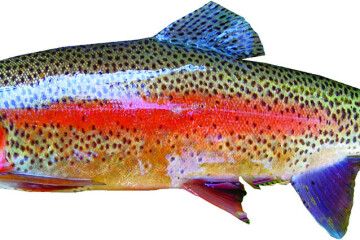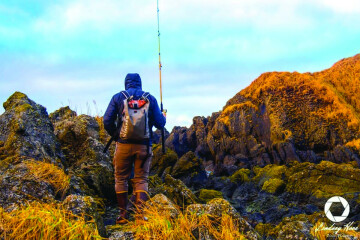The Babbling Brook and other Cliches
Why don’t you describe the sound of the river to the students,” the teacher prompted from the back of the classroom.
When I was young, I always dreaded having to stand up and talk in front of the class. But this time I was not a student. I was a guest lecturer giving a presentation to a roomful of fifth-graders. Their teacher, a neighbor of mine, was introducing them to various outdoor pursuits; biking, kayaking, and hiking, among others, to show them there is more to life than sitting indoors playing video games, and had asked me if I would talk about fly-fishing. I thought it was a worthwhile endeavor, so I agreed. I had a ten-minute time frame in which to talk about the intangible but worthwhile benefits of the outdoor life through fly-fishing.
I started by commenting on the river itself. I told the kids how nice it can be to just stand beside a river. Then I mentioned the trees and the mountains and the clouds. I talked briefly about the wildlife that we sometimes see; the deer and the elk, the hawks and the eagles and, of course, the trout. I described the feeling of being out in the open air, surrounded by nature. I told the students, who sat cross-legged on the floor in front of me, that every time I go fly-fishing, the first thing I do, as corny as it sounds, is stand in silence a moment and listen to the sound of the river. But when the teacher asked me to describe that sound, I hesitated. The kids looked at me in that blank-faced way that kids have, like… huh?
“Well,” I started. And then I stopped.
Have you ever tried to describe the sound of moving water? What’s the first thing that comes to your mind? Babbling brook? Okay, but isn’t that just a bit cliché? No, I didn’t describe it as a babbling brook. And I didn’t say it was burbling. Those words do work but they seem so stereotypical. I didn’t even describe the sound as hypnotic or tranquil, although it is. The truth is, I stumbled, like slipping on a mossy rock at the side of the river. I stood there a moment, in front of a classroom of fifth-graders and didn’t say anything. Then I simply suggested that each student ask their parents to take them to a river, a stream, or a creek, and stop to just listen for themselves. I did say that it was calming, but even that seemed a little too standard.
How do you describe the sound of a river without sounding cliché? Without sounding hackneyed, shopworn and tired? So, I moved on to talk a little about choosing the right fly. I talked about the ring of the rise. I finished my little presentation on fly-fishing by talking about the challenge and satisfaction of making the perfect cast and the thrill of watching the trout jump from the river, thrashing and shaking, water splashing and sparkling like jewels in the sun. I whipped and flopped my arm in the air in front of me like a trout vibrating and shuddering at the end of a fly line. The students laughed and seemed to enjoy that animated part of my little talk. I guess I did look goofy, shaking my arm around like that. At one point I said that sometimes the river sounds like a bowl of Rice Krispies in milk and I heard some snickering and giggling at that, too. I know this is also going to sound pedestrian but it haunted me, the sound of the river. Maybe I shouldn’t use the word haunted. Even that has become a bit cliché when used in relation to a river. Maybe I should say that the sound of moving water preoccupied me, obsessed me, consumed me.
It can sometimes get to the point where any constant sound becomes just white noise to us. The morning sounds of someone in the kitchen; the clinking of dishes and cups, the sounds of coffee percolating can diminish while we are still in bed. The neighbor’s radio. The musical dinging of the windchimes in the backyard. The lawnmower from down the road. If we live on a busy street or near a highway, street sounds and the sound of traffic, even sirens, can eventually go away. They blend in and become part of our life. If we live near the ocean, the sound of the waves, in due course, can sometimes tend to fade away.
Henry David Thoreau, a man who appreciated the sounds of nature, wrote; “Who hears the rippling of a river will not utterly despair of anything.”
That’s a good thing. Right?
I like the word murmur in relation to the sound of a river. Rivers do murmur, don’t they? I like the word susurration, although I’m sure that if I ever used the word I’d get weird looks. Susurration? Who does this guy think he is? I like the words whisper and purr. But even these seem to describe more the sounds of a house cat than a river. W.D. Wetherell, a very good writer who has written a lot about rivers and fly-fishing, compared the sound of a river to a choir or a Bach Cantata which, in an abstract way, makes a lot of sense to me. Rivers also gurgle and gush. They slosh and ripple. They vibrate and froth. Hell, I guess they even babble and burble. And they even susurrate. Cliché words, yes, but they do work, don’t they? And I won’t even go into the sound of rapids. Wetherell used the word symphony as a descriptor for the churning of whitewater. Mark Twain called it “the language of the water.”
Rushing. Rolling. Tossing. Sweeping. Churning.
But sometimes a river is soundless. Well, not soundless. More like a hushed, velvet resonance. Like a gentle breeze through aspen trees. Like the silent thrumming of a butterfly’s wings. Like the delicate inhalations of a sleeping woman in the hour after love. Dulcet. Silken. Honeyed. But I didn’t say that to the students.
After that day in the classroom, I thought a lot about trying to describe the sound of moving water without sounding banal. I have read many descriptions of nature by other writers who have used all of the platitudinous words that I noted above. (Platitudinous? Now there’s a word for ya.) Maybe those writers were the first to use such words, so okay, I guess they get a pass. I suppose the first person who uttered the words “babbling brook” can get away with it. It’s just that now many of those words have become commonplace and unimaginative. In his poem, The Brook, Alfred Lord Tennyson used the word babble. He also used the words bubble, chattering, sparkling, and bickering. Barry Lopez, another great nature writer, never used the words babbling or burbling in relation to the sound of a river. At least I can’t remember ever reading them in any of his books.
I wanted to describe the sound of moving water to a classroom full of fifth-graders, but I couldn’t. I was momentarily flummoxed. The students looked at me like something was wrong. Okay, I did say it sounded like a breakfast cereal. And the more I think about it, that description does kind of work, doesn’t it? I’ll keep trying to come up with new ways to depict river sounds. I am, however, at least sensible enough to stop a moment before I cast my first fly, stand in silence and simply listen to the sound of the river.
Jane Goodall, who has spent a lifetime out in the natural world, used the phrase, “the ecstasy of the mystic,” in her book, A Reason for Hope. If I had written that line, I’m quite sure I’d get more weird looks. Jane Goodall can get away with it. I cannot. So, I won’t say that listening to the sound of a river can bring us a sense of the ecstasy of the mystic.
It does, though. But, shh, don’t tell anyone I said so.



